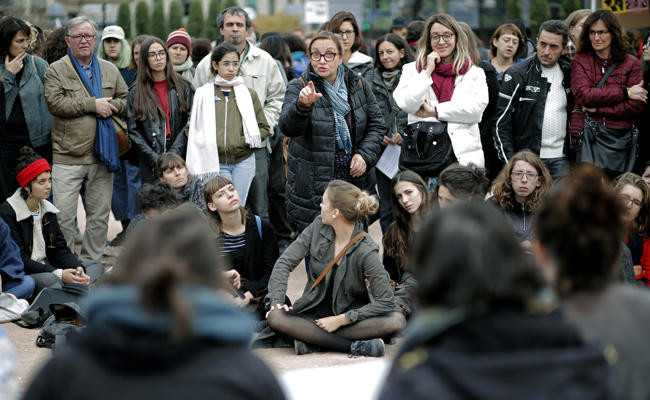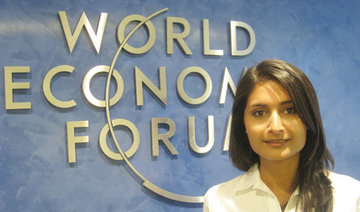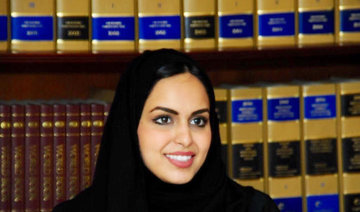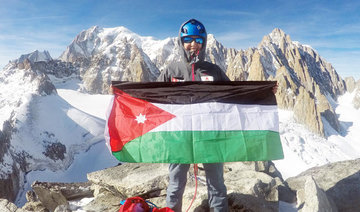LONDON: It started with Harvey Weinstein. Then came allegations against Oscar-winning actors Kevin Spacey and Dustin Hoffman of improper sexual behavior. And the names just keep coming: Musical maestro James Levine, Fox News presenter Bill O’Reilly, and now Ryan Seacrest, host of the hugely popular TV talent show, American Idol.
Then there are those who are not household names — US congressmen, captains of industry, heads of international aid organizations, and the thousands, even tens of thousands, who are significant only to their accusers.
“MeToo” has become a powerful phrase, the hashtag slogan for one of the most wide-reaching popular movements of modern times. Astonishingly it first appeared only four months ago on social media but rapidly went viral, with thousands, then millions, of women — and some men — sharing their own experiences of sexual harassment.
It spread far beyond the English-speaking world. MeToo movements have sprung up from Afghanistan to Vietnam, and spawned splinter movements such as #ChurchToo and #MeTooMilitary.
In the West, MeToo has the power to damage or even end careers: Witness Harvey Weinstein, a colossus of the film industry whose name is now mud not only in Hollywood but within his own family, after his wife left him and his brother all but disowned him.
Or Kevin Spacey, until recently regarded as one of the greatest actors of his generation, but now branded a sexual predator. He was removed from the film “All the Money in the World,” which he had already finished shooting, and his scenes were re-shot with another actor. In addition, he will not appear in the sixth and final season of the hit Netflix political drama “House of Cards,” with the focus of the show instead switching to his on-screen wife, played by Robin Wright.
British Defense Minister Michael Fallon denied allegations of inappropriate behavior but resigned anyway rather than wait to be pushed, saying he had fallen short of the “high standards” expected of the armed forces.
The French version of MeToo positively urges naming and shaming, with the additional hashtag balancetonporc (“denounce your pig”).
But not everyone was completely swept up by the tide. In France, actress Catherine Deneuve led a countercharge, supported by more than 100 women, denouncing the fallout from MeToo as excessive and placing “undeserving people in the same category as sex offenders without giving them a chance to defend themselves.”
Others who questioned the MeToo campaign include writers Margaret Atwood and Lionel Shriver. Atwood called it a symptom of a “broken legal system” in North America, and warned it was in danger of succumbing to the rule of the mob.
“If the legal system is bypassed because it is seen as ineffectual, what will take its place?” she asked.
“Understandable and temporary vigilante justice can morph into a culturally solidified lynch-mob habit, in which the available mode of justice is thrown out the window, and extralegal power structures are put into place and maintained.”
MeToo encouraged women to share their experiences, firstly to show solidarity with each other and also to demonstrate how vast and entrenched is the problem of male entitlement.
Deneuve and others argue that an unwanted hand on the knee is not a violation on a par with rape. It may be unpleasant, annoying and infuriating but surely not traumatic.
However MeToo was an irresistible bandwagon and a prime vehicle for virtue-signaling. At the recent Golden Globes and Bafta ceremonies, black outfits were the order of the day. In an Op-Ed in The New York Times, literary critic and novelist Daphne Merkin dared to suggest that while women were on board with MeToo in public, in private they were fed up with it. Some people — including random women she had spoken to while shopping in the supermarket — were even calling it a “witch-hunt.”
“Privately I suspect many of us, including many long-standing feminists, will be rolling our eyes, having had it with the reflexive and unnuanced sense of outrage that has accompanied this cause from its inception, turning a bona fide moment of moral accountability into a series of ad hoc and sometimes unproven accusations,” she wrote.
While the actions of some are indefensible, Merkin is troubled by the “trickle-down” effect on others tainted by vague, unspecific accusations, possibly relating to incidents from years ago and often made anonymously.
“I don’t believe that scattershot, life-destroying denunciations are the way to upend it,” she said. “In our current climate, to be accused is to be convicted. Due process is nowhere to be found.”
She is equally alarmed by what she perceives as the flight to victimhood — the portrayal of women as too frail and helpless to reject unwanted attention.
Like Atwood, Merkin has been castigated as a “bad feminist” but her words struck a chord. Lucy Hall, 28, from London, who described herself as “a recent survivor of rape” said Merkin’s essay came as “a relief” to her.
“I have felt infuriated and confused by the laziness in the language of the topic, all too often conflating the life-changing event of being raped with an unpleasant but largely forgettable event like being patted on the knee.”
Stella Schindler, a retired judge from New York, said: “I am one of those women on the ‘supermarket lines’ sick of the Salem witch-hunt. Having worked in the so-called man’s world for my entire career, I too experienced various degrees of inappropriate behavior. I just made sure that the best man for the job was a woman: This woman.”
Others question whether social media — little-regulated and rarely moderate in tone — is a suitable platform for debating such an important issue riven with legal implications and even danger.
In Afghanistan, where an estimated 90 percent of women experience sexual harassment in public, at school or at work, the MeToo hashtag was silenced by threats of violence to women who shared their stories. Journalist Maryam Mehtar received death threats and was publicly called a whore by another (male) writer for talking about her daily experiences of sexual harassment in public.
“Social media, and indeed all media, are contested terrain and women can experience empowerment as well as oppression through social media,” said Dr. Meenakshi Gigi Durham, professor of gender, women’s and media studies at the University of Iowa.
“From my perspective, #MeToo has been vital as a consciousness-raising space, a way to provide a forum and voice for the millions of women who have survived sexual assault and harassment, to change the game in terms of the silences and shame around these issues.”
In revealing how widespread sexual harassment is, MeToo has also exposed “the paucity of male power,” said Professor Bev Skeggs, director of the Atlantic Fellows program at the London School of Economics and Political Science.
“From the pathetic attempts to touch without consent to the brutal forms of violence used to damage women … What does it say about types of masculinity when some of the most powerful men in the world resort to such desperate measures?” she said. “The institutional structures that protect these men is where forensic attention should now be drawn.”
However, Durham acknowledged that as the movement grows it is becoming at once more inclusive and more divisive.
“No movement is perfect: There are people whose stories have not been told as much as others,” she said. “At the moment, I think the momentum is very positive in terms of drawing attention to the issues of rape culture that affect all of us, all over the world.
“At least we are having conversations about these things and women’s perspectives are in the foreground, and those are steps in the right direction.”
Is #MeToo starting to do more harm than good?
Is #MeToo starting to do more harm than good?

Gazan twins in Cannes warn ‘nothing left’ of homeland

CANNES: Twin Gazan filmmakers Arab and Tarzan Nasser said they never thought the title of their new film “Once Upon A Time In Gaza” would have such heartbreaking resonance.
“Right now there is nothing left of Gaza,” said Tarzan when it premiered on Monday at the Cannes film festival.
Since militants from Palestinian group Hamas attacked Israel on October 7, 2023, more than 18 months of Israeli bombardment has ravaged large swathes of the Palestinian territory and killed tens of thousands of people.
Israel has vowed to “take control of all” the besieged territory of more than two million inhabitants, where United Nations agencies have warned of famine following Israel’s two-month total blockade.
Israel allowed in several aid trucks on Monday but the UN said it was only “a drop in the ocean” of needs.
The Nasser brothers, who left Gaza in 2012, said their new film set in 2007, when Hamas Islamists seized control of the strip, explains the lead-up to today’s catastrophic war.
“Once Upon A Time In Gaza,” which screened in the festival’s Un Certain Regard section, follows friends Yahia and Osama as they try to make a little extra cash by selling drugs stuffed into falafel sandwiches.
Using a manual meat grinder that does not rely on rare electricity, student Yahia blends up fava beans and fresh herbs to make the patty-shaped fritters in the back of Osama’s small run-down eatery, while dreaming of being able to leave the Israeli-blockaded coastal strip.
Charismatic hustler Osama meanwhile visits pharmacy after pharmacy to amass as many pills as he can with stolen prescriptions, pursued by a corrupt cop.
Israel first imposed a blockade on Gaza in June 2006 after militants there took one of its soldiers, and reinforced it in September 2007 several months after Hamas took power.
“The blockade was gradually tightened, tightened until reaching the genocide we see today,” said Tarzan.
“Until today they are counting the calories that enter,” he added.
An Israeli NGO said in 2012 that documents showed Israeli authorities had calculated that 2,279 calories per person per day was deemed sufficient to prevent malnutrition in Gaza.
The defense ministry however claimed it had “never counted calories” when allowing aid in.
Despite all this, Gazans have always shown a love of life and been incredibly resilient, the directors said.
“My father is until now in northern Gaza,” Tarzan said, explaining the family’s two homes had been destroyed.
But before then, “every time a missile hit, damaging a wall or window, he’d fix it up the next day,” he said.
In films, “the last thing I want to do is talk about Israel and what it’s doing,” he added.
“Human beings are more important — who they are, how they’re living and adapting to this really tough reality.”
In their previous films, the Nasser twins followed an elderly fisherman enamoured with his neighbor in the market in “Gaza Mon Amour” and filmed women trapped at the hairdresser’s in their 2015’s “Degrade.”
Like “Once Upon A Time in Gaza,” they were all shot in Jordan.
As the siege takes its toll in “Once Upon A Time In Gaza,” a desolate Yahia is recruited to star in a Hamas propaganda film.
In Gaza, “we don’t have special effects but we do have live bullets,” the producer says in one scene.
Arab said, long before Gazan tap water became salty and US President Donald Trump sparked controversy by saying he wanted to turn their land into the “Riviera of the Middle East,” the coastal strip was a happy place.
“I remember when I was little, Gaza actually was a riviera. It was the most beautiful place. I can still taste the fresh water on my tongue,” he said.
“Now Trump comes up with this great invention that he wants to turn it into a riviera after Israel completely destroyed it?“
Hamas’s October 2023 attack resulted in the deaths of 1,218 people on the Israeli side, mostly civilians, according to an AFP tally based on official figures.
Militants also took 251 hostages, 57 of whom remain in Gaza including 34 the military says are dead.
Israel’s retaliatory offensive has killed 53,486 people in Gaza, mostly civilians, according to Gaza health authorities, whose figures the United Nations deems reliable.
Gaza health authorities said at least 44 people were killed there in the early hours of Tuesday.
Rapper Werenoi, France’s biggest-selling music artist in recent years, dies at age 31

PARIS: Rapper Werenoi, France’s biggest-selling music artist in recent years, has died at the age of 31, his producer and record company said.
The artist, whose real name was Jérémy Bana Owona, was the number 1 album seller in France in 2023 and 2024 according to the ranking of the National Union of Phonographic Industry, which includes in-store and e-commerce sales as well as plays on streaming services.
“It’s with immense sadness that we’ve learned of Werenoi’s passing,” his record company Believe said on Instagram. “All our thoughts are with his family, loved ones, his team and everyone who knew him.”
“Rest in peace my brother, I love you,” his producer Babs posted on X.
French media report Werenoi died early Saturday in a Paris hospital. The cause of his death has not been made public.
Werenoi first became known to the French public in 2021 when he posted his song “Guadalajara” on YouTube and it was viewed hundreds of thousand times.
He released three albums, “Carré” in 2023, “Pyramide” the next year and “Diamant Noir” last month, making him one of the biggest names in French rap.
Several French rappers posted tributes on social media. French-Malian pop star Aya Nakamura, who featured on his second album, wrote : “Rest in peace my dude. A news that saddens me and courage to the loved ones especially.”
“He made a difference for the quality of his songs, his melodies and his punchlines,” singer Pascal Obispo, who had accompanied Werenoi on the piano at a 2023 Paris concert, told French newspaper Le Parisien.
Adidas, Puma family feud to be turned into TV series

CANNES: The bitter brotherly feud that sparked the creation of sports-shoe brands Adidas and Puma in the same small German town in the 1940s is to be turned into a television series with the help of family archives, its producers announced Sunday.
Hollywood-based film producer No Fat Ego is backing the project, which has the blessing of the family behind the Adidas empire founded by Adolf “Adi” Dassler.
It will delve into one of the most fascinating fraternal blow-ups in corporate history, which pitted Adi against his brother Rudolf (“Rudi“) who went on to create rival Puma.
The two men jointly ran a family-owned footwear company before falling out during World War II, with their post-conflict animus splitting their town of Herzogenaurach to this day.
Scriptwriter Mark Williams, behind the hit Netflix series “Ozark,” has been hired to lead the project and is currently going through Dassler family home videos and memorabilia to work on the story.
“Everybody knows the brands, but the story behind them is something we don’t really fully know,” Williams told AFP at the Cannes film festival.
One of the most sensitive areas — particularly for the reputations of the multi-billion-dollar footwear companies today — will be how the brothers are portrayed during the war period.
Both became members of the Nazi party in the 1930s, as was customary for the business elite at the time.
Rudi went to fight, however, and was arrested by Allied forces on his return to a defeated Germany.
“Adi stayed home and tried to keep the company alive,” Williams added.
Their factory was seized as part of the war effort and converted into a munitions plant.
The series promises to be a “Succession-type drama between the family” set over several generations, Williams explained, comparing it to the earlier hit HBO series.
The head of No Fat Ego, Niels Juul, who has produced Martin Scorsese’s most recent movies, said he was originally drawn to the story after learning about Adidas’s collaboration with legendary black American runner Jesse Owens.
Partly thanks to Adidas’s innovative spiked shoes, Owens became one of the stars of the 1936 Berlin Olympics which Hitler had hoped would showcase white German supremacy.
No Fat Ego intends to develop the series with full editorial independence before offering it to streaming platforms.
“We want to have the creative control, and Mark has to have absolute silence and quiet to do what he does,” Juul told AFP.
Iraq’s first filmmaker in Cannes says sanctions no piece of cake

CANNES: Hasan Hadi, the first filmmaker from Iraq to be selected for the prestigious Cannes Festival, said economic embargoes like those imposed in his childhood under Saddam Hussein did not work.
“Sanctions empower dictators,” he told AFP, as they concentrate scant resources in their hands and only make them “more brutal.”
“In the history of the world, there was no one time when they (imposed) sanctions and the president couldn’t eat.”
Hadi’s first feature film, “The President’s Cake,” has received very good reviews since premiering Friday in the Directors’ Fortnight section.
Cinema publication Deadline said it was “head and shoulders above” some of the films in the running for the festival’s Palme d’Or top prize, and “could turn out to be Iraq’s first nominee for an Oscar.”
The film follows nine-year-old Lamia after she has the misfortune of being picked by her school teacher to bake the class a cake for the president’s birthday, or be denounced for disloyalty.
It is the early 1990s, the country is under crippling UN sanctions. She and her grandmother — with whom she shares a reed home in Iraq’s southern marshlands — can barely afford to eat.
As they set off into town to hunt down unaffordable ingredients, with Lamia’s pet cockerel and their last meagre belongings to sell, the film plunges into the social reality — and everyday petty corruption — of 1990s Iraq.
The near-total trade and financial embargo imposed on Iraq after it invaded Kuwait “demolished the moral fabric of society,” Hadi said.
It sent the country “hundreds of years back.”
The filmmaker said he did not taste cake until he was in his early teens, after the US-led invasion in 2003 toppled Saddam and sanctions were lifted.
Instead, with processed sugar and eggs out of reach, there was “date cake” — whose main ingredient was squished dates, sometimes with a candle on top.
“As a kid you’re sad that you’re not getting your cake,” he said. But as you grow up, you realize what your parents must have gone through to put food on the table.
“Not only my family, but all of these people had to sell literally everything,” he said. “There were people that were even selling their door frames.”
Hadi and his team shot the film entirely in Iraq.
It beautifully captures the ancient wetlands in the south of the country, listed as a World Heritage Site since 2016 and reputedly the home of the biblical Garden of Eden.
Saddam drained them in the 1990s, trying to flush out rebels hiding in the reeds.
But after the US-led invasion, authorities opened up the valves and the wetlands flourished again — even if they are now threatened by climate change.
Hadi said he chose the location partly to make the point that “the marshes stayed and Saddam went away.”
To re-create the Iraq of his youth, Hadi and his crew paid close attention to detail, amassing vintage clothes and bringing a barber on set to trim the hair and moustaches of everyone down to the extras.
They scouted out the best locations, shooting one scene in a small eatery reputed to have been frequented by Saddam himself.
They chose non-actors to play ordinary Iraqis under the ever-present eyes of the president in posters, pictures frames and murals.
Hadi said hearing US President Donald Trump say recently that he planned to lift sanctions on Syria after Islamists toppled president Bashar Assad last year was “amazing.”
“I don’t think the sanctions helped in any way to get rid of Bashar, but definitely empowered him to kill more people, and torture more people,” he said.
Austria wins Eurovision crown with JJ’s song Wasted Love

BASEL, Switzerland: Austria won the Eurovision Song Contest 2025 in Swiss host city Basel on Saturday, with the country’s first victory since bearded drag queen Conchita Wurst won in 2014.
Operatic singer JJ won ahead of Israel in the world’s biggest music competition, which was watched by more than 160 million people across the world.
The win was Austria’s third in the competition, following Conchita’s success and Udo Juergens’ victory in 1966.
JJ, a 24-year-old from Vienna, combined elements of opera, techno and high-pitched vocals in his song Wasted Love, winning the hearts of the professional juries and telephone voters.
Switzerland won the right to host Eurovision after Swiss rapper and singer Nemo won last year’s contest in Malmo, Sweden.
Fans traveled from across Europe and beyond to Basel, with 100,000 people attending Eurovision events in the city, including the final.
Eurovision, which stresses its political neutrality, has also faced controversy again this year due to the war in Gaza.
Israel’s entrant, Yuval Raphael, was at the Nova music festival during the October 7, 2023, attack by Hamas militants on southern Israel that killed 1,200 people and saw 251 taken hostage, according to Israeli officials.
Pro-Palestinian groups urged the European Broadcasting Union to exclude Israel over Gaza, where more than 50,000 people have been killed in the ensuing offensive by Israel, according to local health officials.
Around 200 protesters mounted a demonstration in Basel on Saturday evening.
Spanish public broadcaster RTVE also showed a message before the start of the Eurovision show saying “When human rights are at stake, silence is not an option. Peace and Justice for Palestine.”




















